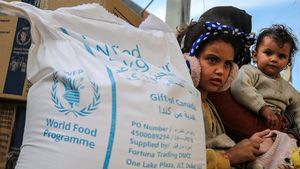JAKARTA - During the rainy season there is a fairly extreme weather change and causes the air temperature to be relatively colder. The human body is very sensitive to changes in temperature so that the body will try hard to adjust to the temperature and this can affect the immune system. That's why, during the transition season, people often become sick because the body's immunity is disturbed.
A number of diseases that need to be watched out for in the rainy season include acute respiratory infections (ARI), namely cough, runny nose, influenza, and bronchitis, there are also diseases caused by viral infections from the Aedes Aegypti mosquito, namely Zika disease (Zika disease), Dengue Hemorrhagic Fever (DHF), and Chikungu fever.
In addition, there is also the risk of disease disturbances caused by pathogens (bacterials, parasites, fungi), especially attacking areas that contain a lot of garbage and are affected by flooding.
"If garbage contaminates food ingredients, ready-to-eat food, or water, then when consumed it can destroy certain cells in the body and cause typhoid fever, pavetage, and hepatitis as well as hepatitis," said Medical Underwriter Sequis, Dr. Aloina Ita Tarigan, quoted from ANTARA, Monday, October 17.
Then mention other diseases that should be watched out for during the rainy season, namely wet lung disease. According to him, if the air is too cold, the room is not getting sunlight, and the circulation/exchange of the air is lacking, it causes it to become damp.
Wetting places can increase the breeding of viruses, bacteria, fungi, and mites. Moreover, if the room is dirty, there is a lot of dust, and is often used for smoking. This is the reason why those who routinely use the room are easily exposed to wet lung disease.
To be able to find out whether a person has a wet lung disease, you can do an examination by a lung specialist. Doctors will usually conduct medical interviews, conduct physical examinations, and if necessary, a supporting examination will be carried out, such as phlegm examination, blood, x-ray pulmonary, or CT (Computer Tomography) to detect some lung problems.
"If liquid is found to be piling up, the doctor will conduct further examinations to find out whether there is inflammation of cancer cells or infections through the Ultrasound chest ultrasound," he said.
In some of the wet lung conditions may not be severe and can recover quickly. On the other hand, if you have been infected with wet lungs but are left or not treated medically, the disease can develop more severe and serious. Patients often need ventilator assistance at Intensive Care Unit (ICU) treatment.
The installation of breathing apparatus is done because one of the symptoms of the lungs is difficulty breathing or shortness of breath. In some people these conditions can endanger lives.
Debris suggests that people recognize symptoms, including dry coughs and fever, difficulty breathing while lying down, chest pain to shortness of breath for a long or repeated period of time.
"Don't let us ignore, guess, or try to heal ourselves. The sooner it is recognized, the faster it is treated by doctors and reduces the risk of disease getting worse," he suggested.
He then suggested that people pay attention to cleanliness in the house, ensure that bedrooms have good air ventilation, always wash their hands with soap and clean water and wear masks in polluting environments or when they are close to people who appear to be flu and coughing.
According to him, it is also better for people to fortify themselves with influenza vaccines and pneumonia vaccines (PTPV vaccines) because the virus that causes this disease works by infecting the upper respiratory tract and causing pneumonia.
The English, Chinese, Japanese, Arabic, and French versions are automatically generated by the AI. So there may still be inaccuracies in translating, please always see Indonesian as our main language. (system supported by DigitalSiber.id)













